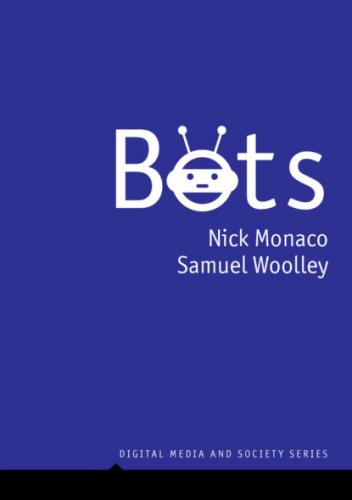Bots. Nick Monaco
188
189 189
190 190
191 191
192 192
193 193
194 194
195 195
196 196
197 197
198 198
199 199
Bots
nick monaco and samuel woolley
polity
Copyright Page
Copyright © Nick Monaco and Samuel Woolley 2022
The right of Nick Monaco and Samuel Woolley to be identified as Authors of this Work has been asserted in accordance with the UK Copyright, Designs and Patents Act 1988.
First published in 2022 by Polity Press
Polity Press
65 Bridge Street
Cambridge CB2 1UR, UK
Polity Press
101 Station Landing
Suite 300
Medford, MA 02155, USA
All rights reserved. Except for the quotation of short passages for the purpose of criticism and review, no part of this publication may be reproduced, stored in a retrieval system or transmitted, in any form or by any means, electronic, mechanical, photocopying, recording or otherwise, without the prior permission of the publisher.
ISBN-13: 978-1-5095-4358-8 (hardback)
ISBN-13: 978-1-5095-4359-5 (paperback)
A catalogue record for this book is available from the British Library.
Library of Congress Control Number: 2021949069
by Fakenham Prepress Solutions, Fakenham, Norfolk NR21 8NL
The publisher has used its best endeavours to ensure that the URLs for external websites referred to in this book are correct and active at the time of going to press. However, the publisher has no responsibility for the websites and can make no guarantee that a site will remain live or that the content is or will remain appropriate.
Every effort has been made to trace all copyright holders, but if any have been overlooked the publisher will be pleased to include any necessary credits in any subsequent reprint or edition.
For further information on Polity, visit our website: politybooks.com
Acknowledgments
At this point, it’s hard to believe there was ever a time in my life when I hadn’t heard the word “bot.” The last decade of research and learning has been a thrilling journey, and I’m grateful for all the wonderful people I’ve met along the way. In no particular order, I want to express my deepest thanks to Tim Hwang, Marina Gorbis, John Kelly, Vladimir Barash, Camille François, Phil Howard, Clint Watts, Mark Louden, Frieda Ekotto, Helmut Puff, Roman Graf, Ralph Hailey, Rosemarie Hartner, Chou Changjen, Yao Yuwen, and Yauling and Joel for their support, guidance, and encouragement. I’m continually inspired by all the courageous journalists, activists, and researchers I’ve worked with over the years, especially my colleagues and friends in Taiwan – your work changes lives. A huge thanks to my friends Sam C., Nate, Amanda, Ike, Anj, Sylvia, Quin, Renata, Samantha, Jake, Jackie, Skyler, Trevor, Jane, and Doug for making life so full and always being up for an interminable conversation. My co-author, Sam Woolley, you’ve been an incredible friend and colleague, and I’m already looking forward to our next project. Lastly and above all, I’m most grateful to my wonderful family – Mom, Dad, Grammy, Mark, Ben, Britnea, Franki, Rocco, Benni, Murphy, Andi, and all the Monacos and Carmacks. Your love has made me who I am. There’s no better family on Earth.
Nick
First and foremost, I would like to thank my family for their constant, enthusiastic, support of my work. Without their encouragement, advice, and love I would never be able to do what I do. To Samantha, Pip, Mum, Dad, Oliver, Justin, Daniela, Manuela, Basket, Mathilda, Banjo, Charlie, and the Woolley, Donaldson, Loor, Shorey, Westlund, and Joens families – a sincere thank you for everything. To all of my friends – particularly Nick Monaco – thank you so very much for all of the learning and laughs. You make each day fun and inspiring. I’d also like to thank the members of my research team, the Propaganda Research Lab, collaborators at the Center for Media Engagement, and colleagues at the School of Journalism and Media and Moody School of Communication – all at the University of Texas at Austin. Finally, I’d like to thank the organizations that support my ongoing research, particularly Omidyar Network, the Open Society Foundations, and the Knight Foundation.
Sam
Abbreviations
AI – Artificial Intelligence
ANT – Actor Network Theory
ASA – Automated Social Actors
CUI – Conversational User Interface
GPU – Graphics Processing Unit
GUI – Graphical User Interface
HCI – Human–Computer Interaction
HMC – Human–Machine Communication
IO – Information Operations
IRC – Internet Relay Chat
ML – Machine Learning
MT – Machine Translation
MUD – Multi-user domain, multi-user dungeon
NLP – Natural Language Processing
RES – Robot Exclusion Standard
STS – Science, Technology, and Society studies
1 What is a Bot?
The 2020 United States presidential election was one of the most impassioned in the country’s history. President Donald Trump and his Democratic opponent Joe Biden both contended they were fighting for nothing less than the future of American democracy itself. The election brought with it several events rarely seen in the history of American democracy – an election held in the middle of a global pandemic, citizens’ storming of the US Capitol, and attempts by a sitting president to overturn the results of a free and fair election. Unprecedented events weren’t only taking place offline, however – social bots, or computer programs posing as humans on social media sites such as Twitter and Facebook, were beginning to use artificial intelligence (AI) techniques to fly under the radar of security teams at social media platforms and target voters with political messages. One of the leading bot detection experts in the US bluntly admitted,
Back in 2016, bots used simple strategies that were easy to detect. But today, there are artificial intelligence tools that produce
